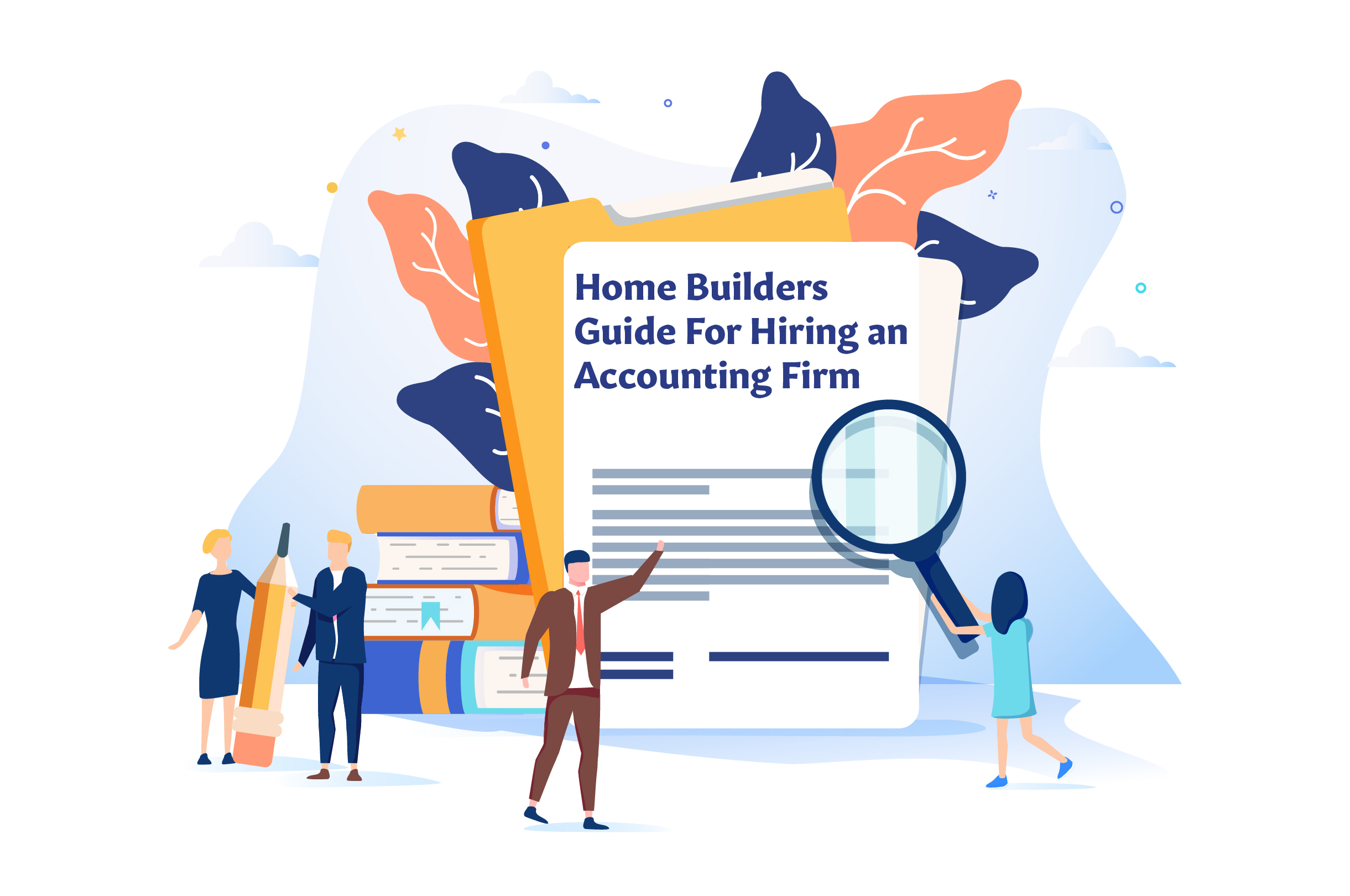Choosing the right accounting firm is a critical decision for custom home builders. The firm will need to provide expertise tailored to the construction industry: managing project cash flow, work in progress (WIP) reporting, job costs, compliance, and the overall financial health of a builder business. It is important to invest the time in finding an accounting partner who specializes in construction. Otherwise, you will likely continue to struggle understanding the financials of your business and maintain adequate project cash flow. Here’s a guide for home builders hiring a firm as the the ideal accounting partner:
1. Identify Your Business Needs
- Specialized Expertise: Look for a firm experienced in working with home builders or businesses in the construction industry. They should understand project-based accounting, job costing, WIP reporting, and industry-specific tax regulations.
- Service Scope: Decide what you would like to include in the scope of work you will outsource to an accounting firm. Do you need bookkeeping, payroll services, tax preparation, or a comprehensive turnkey back office support solution? Ask the accounting firm what lines of service they can offer to support your builder business and make sure they can cover your needs.
- Software Proficiency: Ensure your accounting firm partner is familiar with construction-specific accounting and construction management software, such as Adaptive, JobTread, or Sage Construction Management.
2. Verify Credentials and Experience
- Qualifications: Ensure the firm has at least one Certified Public Accountant (CPA) with expertise in construction accounting and a team dedicated to the construction industry.
- Industry Knowledge: Ask about their experience working with construction businesses similar in size and scope to yours. Come up with a couple of questions related to pain points you are currently facing in your business and observe the value you receive in how they respond to your questions.
- References: Request testimonials or references from other home builders or construction clients.
3. Evaluate Their Understanding of Construction-Specific Issues
- Job Costing: The firm should know how to allocate costs to specific projects accurately. If they cannot hold a conversation with you related to job costs and issues you face in your day-to-day related to job costing, I recommend you be leary of their experience working with builders.
- Revenue Recognition: Ensure they can handle percentage-of-completion and completed-contract methods, as appropriate, on both the accounting side and the tax side of your business.
- Cash Flow Management: They should be equipped to offer strategies for managing short-term and long-term projects as well as proactive strategies to maintain sufficient project cash flow.
4. Assess Their Tax Expertise
- Industry Tax Benefits: They should understand construction-related deductions like Section 179, depreciation of tools and equipment, and construction-related tax credits. In addition to deductions, it is important to assess their understanding of other tax regulations, for example entity structures and tax elections, proper tax accounting methods (cash, completed contract, percentage of completion), and the IRS 10% election and lookbacks.
- Local Regulations: The firm should be well-versed in state and local tax laws affecting home builders. For example, in Tennessee, builders have the benefit of a subcontractor tax deduction when calculating annual business tax. Builders in Tennessee are also responsible for maintaining adequate business licenses in any jurisdiction within which they are working and anticipate $100,000 or more in gross receipts during a tax reporting period.
- Audit Readiness: Choose a firm that has the resources to assist with contractor license renewal requirements and to support IRS inquiries as needed.
5. Look for a Proactive Approach
- Financial Insights: Seek a firm that goes beyond number-crunching to provide strategic advice and identify opportunities for growth.
- Regular Communication: Ensure they are willing to collaborate frequently to discuss updates, day-to-day challenges, and strategic planning.
- Scalability: Choose a firm that can grow with your business, offering additional value-added services as your business needs grow.
6. Compare Pricing and Value
- Fee Structure: Understand their pricing model (hourly, flat fee, or retainer) and what services are included with the proposed fee. Ensure the professional fees fit within your overhead budget.
- Value-Added Services: Consider firms that offer extras like financial forecasting, job cost accounting software implementations, training for your in-house staff, or other construction-specific consulting services.
7. Check Availability and Responsiveness
- Dedicated Account Manager: Ensure you have a point of contact who understands your business and is available for consultations as needed.
- Timeliness: Confirm their ability to meet deadlines for weekly vendor payments, periodic payroll, financial reporting, and tax compliance.
8. Conduct an Interview
- Ask Questions: Inquire about their experience, processes, communication style, and potential challenges they anticipate for a business like yours.
- Scenario Testing: Present a hypothetical issue your business has faced and evaluate their response.
- Alignment of Values: Ensure their approach aligns with your company’s vision, culture, and operational needs.
9. Utilize Technology
- Cloud-Based Integrations: Prefer firms that understand and leverage cloud accounting software for real-time updates and ease of collaboration.
- Data Security: Inquire about their information security standards and procedures to ensure their systems comply with data security and confidentiality standards.
10. Build a Long-Term Relationship
- Partnership: View the accounting firm as a partner invested in your success. It is costly (both time and financial) to transfer accounting responsibilities to a new firm. Make sure you are investing in an accounting partner who is best equipped to meet the needs of your construction business.
- Regular Reviews: Schedule periodic evaluations of mutual collaboration expectations to ensure continued alignment.
By taking these steps, home builders can hire an accounting firm that not only manages the financial side of their businesses but also contributes to strategic growth and long-term stability.
If you’d like to discuss the proven construction accounting framework we implement for our clients, we would be honored to have the opportunity. Please email us at: intro@everscpa.com.
